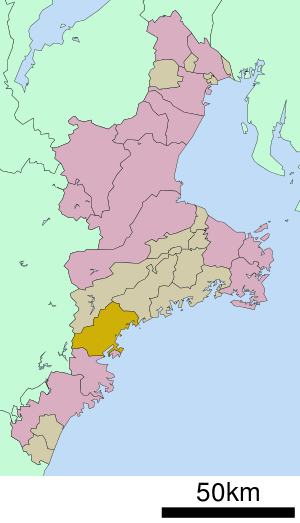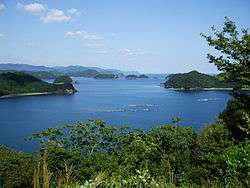Kihoku, Mie
| Kihoku 紀北町 | |||
|---|---|---|---|
| Town | |||
|
Kumano Bay in Kihoku | |||
| |||
 Location of Kihoku in Mie Prefecture | |||
 Kihoku
| |||
| Coordinates: 34°7′N 136°14′E / 34.117°N 136.233°ECoordinates: 34°7′N 136°14′E / 34.117°N 136.233°E | |||
| Country | Japan | ||
| Region | Kansai | ||
| Prefecture | Mie Prefecture | ||
| District | Kitamuro | ||
| Area | |||
| • Total | 257.01 km2 (99.23 sq mi) | ||
| Population (September 2012) | |||
| • Total | 17,885 | ||
| • Density | 69.6/km2 (180/sq mi) | ||
| Time zone | Japan Standard Time (UTC+9) | ||
| City symbols | |||
| • Tree | Hinoki | ||
| • Flower | Japanese lily | ||
| • Bird | Japanese murrelet | ||
| • Fish | Ocean sunfish | ||
| Phone number | 0597-32-3901 | ||
| Address | 495-8 Aikga, Kihoku-chō, Kitamuro-gun, Mie-ken 519-5701 | ||
| Website |
www | ||
Kihoku (紀北町 Kihoku-chō) is a town located in Mie Prefecture, Japan. As of September 2012, the town had an estimated population of 17,885 and a population density of 69.6 persons per km2. The total area was 257.01 km2.
Geography
Kihoku is located in southeastern the Kii Peninsula in southern Mie Prefecture, facing the Pacific Ocean. Kihoku is surrounded by river, sea, and mountain, and has a beautiful setting.
Neighboring municipalities
- Mie Prefecture
- Nara Prefecture
History
The town of Kihoku was established on October 11, 2005 by the merger of the towns Kii-Nagashima and Miyama.
Economy
Kihoku serves as a commercial center for the surrounding region. Commercial fishing and forestry are the major employers. A well-known product of the former town of Miyama is saury sushi because of the large local catch of saury. At Kihoku, there is the static inverter plant of Kii Channel HVDC system.
Transportation
Railway
Highway
Local attractions
A portion of the Sacred Sites and Pilgrimage Routes in the Kii Mountain Range, a UNESCO World Heritage Site is located within Kihoku.
Noted people
- Yoshihiko Wada - artist
External links
![]() Media related to Kihoku, Mie at Wikimedia Commons
Media related to Kihoku, Mie at Wikimedia Commons
- Kihoku official website (Japanese)
